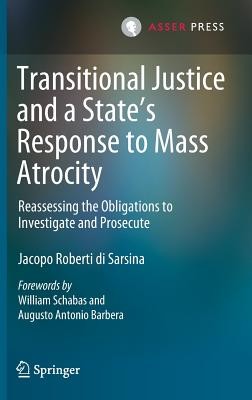
- Išsiųsime per 10–14 d.d.
- Autorius: Jacopo Roberti Di Sarsina
- Leidėjas: T.M.C. Asser Press
- ISBN-10: 9462652759
- ISBN-13: 9789462652750
- Formatas: 15.6 x 23.4 x 1.8 cm, kieti viršeliai
- Kalba: Anglų
- Extra -15 % nuolaida šiai knygai su kodu: ENG15
Transitional Justice and a State's Response to Mass Atrocity + nemokamas atvežimas! | knygos.lt
Atsiliepimai
Aprašymas
This book brings a new focus to the ongoing debate on holding perpetrators of massivehumanitarian and human rights violations accountable in countries in transition.It provides a clear-cut and comprehensive legal analysis of the content and nature of astate's obligations to investigate and prosecute as enshrined in the most importanthumanitarian and human rights treaties; it disentangles the common fallacy that theseprocedural obligations are naturally rooted and clearly spelled out in the general humanrights treaties; and it explains the flaws in an absolutist interpretation. This analysisserves to understand whether such procedural obligations, if narrowly construed, actas impediments to countries emerging from periods of conflict or systematic repressionin the face of contingent circumstances and the formidable dilemmas raised by aunivocal understanding of justice as retribution.Exploring the latest instances of interpretation and application via an analysis of statepractice, the jurisprudence of treaty bodies, international courts and tribunals, softlaw instruments, and doctrinal contributions, the book also addresses the complexissue of amnesty, and other transitional justice mechanisms designed to restore peaceand facilitate transition traditionally included in national reconciliation programs, and criticizes the contention that amnesty is always prohibited by international law.It also considers these problems from the viewpoint of the International CriminalCourt, focusing on the cases of Uganda and Colombia after the 2016 peace agreement.Lastly, the volume offers a detailed analysis of techniques that may neutralize relevantobligations under international law, such as denunciation, derogation, limitation, andthe public international law defenses of force majeure and necessity.
Drawing attention to the importance of a multidisciplinary and practical approach tothese unsettling questions, and endorsing a pluralistic notion of accountability, thebook will appeal to legal scholars and transitional justice experts as well as practitioners, human rights advocates, and government officials.
Dr Jacopo Roberti di Sarsina is an International Law Expert at the Alma MaterStudiorum - University of Bologna School of Law, and a dual-qualified lawyer (Italy andNew York). He completed a PhD in public international law, label Doctor Europaeus, at the School of International Studies, University of Trento, holds an LLM from NYUSchool of Law, and read law at the University of Bologna.
EXTRA 15 % nuolaida
Kupono kodas: ENG15
Akcija baigiasi už 1d.03:57:29
Nuolaidos kodas galioja perkant nuo 10 €. Nuolaidos nesumuojamos.

- Autorius: Jacopo Roberti Di Sarsina
- Leidėjas: T.M.C. Asser Press
- ISBN-10: 9462652759
- ISBN-13: 9789462652750
- Formatas: 15.6 x 23.4 x 1.8 cm, kieti viršeliai
- Kalba: Anglų
Exploring the latest instances of interpretation and application via an analysis of statepractice, the jurisprudence of treaty bodies, international courts and tribunals, softlaw instruments, and doctrinal contributions, the book also addresses the complexissue of amnesty, and other transitional justice mechanisms designed to restore peaceand facilitate transition traditionally included in national reconciliation programs, and criticizes the contention that amnesty is always prohibited by international law.It also considers these problems from the viewpoint of the International CriminalCourt, focusing on the cases of Uganda and Colombia after the 2016 peace agreement.Lastly, the volume offers a detailed analysis of techniques that may neutralize relevantobligations under international law, such as denunciation, derogation, limitation, andthe public international law defenses of force majeure and necessity.
Drawing attention to the importance of a multidisciplinary and practical approach tothese unsettling questions, and endorsing a pluralistic notion of accountability, thebook will appeal to legal scholars and transitional justice experts as well as practitioners, human rights advocates, and government officials.
Dr Jacopo Roberti di Sarsina is an International Law Expert at the Alma MaterStudiorum - University of Bologna School of Law, and a dual-qualified lawyer (Italy andNew York). He completed a PhD in public international law, label Doctor Europaeus, at the School of International Studies, University of Trento, holds an LLM from NYUSchool of Law, and read law at the University of Bologna.





Atsiliepimai